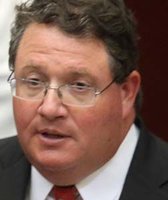Stand up for the facts!
Our only agenda is to publish the truth so you can be an informed participant in democracy.
We need your help.
I would like to contribute

In this Jan. 6, 2021 photo, supporters of then-President Donald Trump try to break through a police barrier at the Capitol in Washington. (AP)
If Your Time is short
- Under almost any circumstances, experts said, undercover government operatives and informants cannot be described in government filings as unindicted co-conspirators. The main reason: A component of criminal conspiracy is the agreement to commit a crime. That isn’t what undercover operatives do.
It’s been almost six months since hundreds of pro-Trump rioters stormed the U.S. Capitol on Jan. 6 in a brazen attempt to stop Congress from certifying Joe Biden’s victory in the 2020 presidential election.
Since then, some have tried to pass the blame onto others, like antifa. Others tried to claim that it was just an ordinary "tourist visit."
Now, a new theory has emerged: the entire breach was secretly orchestrated by the FBI.
This new idea originated from a June 14 article by Revolver News, a right-leaning website run by Darren Beattie — a former Trump White House speechwriter who was fired in 2018 after he appeared on a panel with a white nationalist. In 2020, Beattie was appointed to a commission to oversee U.S. Holocaust memorials.
The story’s premise was quickly and prominently promoted by Fox News host Tucker Carlson. It soon made its way to the Twitter accounts of Republican politicians, like Reps. Marjorie Taylor Greene of Georgia and Matt Gaetz of Florida, and was amplified in various viral social media posts.
Sign up for PolitiFact texts
Revolver’s article, headlined, "Unindicted Co-Conspirators in 1/6 Cases Raise Disturbing Questions of Federal Foreknowledge," speculates that because there are unindicted, unnamed co-conspirators included in some of the Capitol rioters federal charging documents, it’s reasonable to assume that those people are FBI informants or agents.
It also questions whether these figures were "instigators" during the storming of the Capitol, suggesting that not only was the government involved, but its agents also caused violence and damage, and did nothing to stop it.
The story never answers its own questions and only offers circumstantial evidence, including the fact that informants and undercover FBI operatives were involved in the foiled October 2020 plot to kidnap Michigan Gov. Gretchen Whitmer and take over the state government.
Steven D’Antuono, the former director of the Detroit FBI field office, was promoted to help lead the FBI’s Washington, D.C., office after his team successfully thwarted the kidnapping. He is now working on the Capitol riot cases. The story claims this is suspicious, and says D’Antuono was "quietly promoted." But the FBI issued a press release about the news and local media wrote stories about it.
In any case, this comparison is fraught. The plot in Michigan never happened, as is the case with most schemes that involve undercover agents and result in criminal charges.
More importantly, experts explained that, under almost any circumstances, undercover government operatives and informants cannot be described in government filings as co-conspirators. The main reason: A component of criminal conspiracy is the agreement to commit a crime. That isn’t what undercover operatives do.
"An undercover FBI informant or agent cannot be an unindicted co-conspirator," said Ira P. Robbins, a law and justice professor at American University who has studied and written about unindicted co-conspirators. "The elements of the crime of conspiracy include the specific intent to commit the target crime. The FBI informant or agent would not have that intent."
Lisa Griffin, a law professor at Duke University who specializes in constitutional criminal procedure and federal criminal justice, called the suggestion "absurd."
"Undercover agents do not commit the crime of conspiracy by conducting an investigation," she said. "Referencing unindicted co-conspirators is disfavored but necessary in some situations, although never to document the role of law enforcement agents."
PolitiFact reached out to Revolver News but did not hear back. The FBI declined to comment.
The Justice Department’s manual, a reference for U.S. attorneys and department employees responsible for federal prosecutions, stipulates that, in almost all cases, federal prosecutors generally should not identify unindicted co-conspirators in conspiracy indictments.
"Ordinarily, there is no need to name a person as an unindicted co-conspirator in an indictment in order to fulfill any legitimate prosecutorial interest or duty," the provision says.
"For purposes of indictment itself, it is sufficient, for example, to allege that the defendant conspired with ‘another person or persons known.’ In any indictment where an allegation that the defendant conspired with ‘another person or persons known’ is insufficient, some other generic reference should be used, such as ‘Employee 1’ or ‘Company 2’. The use of non-generic descriptors, like a person's actual initials, is usually an unnecessarily-specific description and should not be used."
Griffin noted that the most famous example of an unindicted co-conspirator was Richard Nixon during the Watergate scandal. Another is when Donald Trump was called "individual one" in the indictment of his former lawyer Michael Cohen. Trump was all but an unindicted co-conspirator, she said, although not actually identified as one.
Besides being a sitting president, there are multiple other reasons why someone might be included in an indictment as an unindicted co-conspirator: They haven’t been identified, there isn’t enough evidence to bring charges against them, they’ve been granted immunity of some kind, various cooperation deals, prosecutorial guidelines that counsel against charging, or other shortfalls in the cases that require delaying or forgoing charges.
The Revolver story singles out certain unnamed persons in the government’s filings for Thomas Caldwell, a 65-year-old alleged Capitol rioter and member of the Oath Keepers, a far-right anti-government militia group.
But those same documents contradict the article’s own premise.
The indictment begins by identifying "PERSON ONE" as the leader of the Oath Keepers. It’s well known that person is Stewart Rhodes. Rhodes has publicly accused prosecutors of manufacturing made-up crimes. There’s no evidence he’s an undercover government agent.
The Washington Post reported that there’s reason to believe that "PERSON TWO" in the documents, who the Revolver article depicted as suspicious, is Caldwell’s wife. She has not been charged with a crime. The indictment says that Caldwell and person two took "selfie" photos of themselves on the balcony and in other areas around the capitol. The Post reported that, on Facebook, Caldwell posted photos of him and his wife, writing "Us storming the castle. Please share. Sharon is right with me. I am such an instigator!"
A photograph captured in court documents shows Thomas Caldwell with an unidentified person on the Capitol balcony. (U.S. Department of Justice)
In two separate June hearings in front of Congress, FBI director Christopher Wray and Pentagon officials answered questions about the failure to adequately prepare for and respond to the Jan. 6 attack.
Wray, who was appointed by Trump in 2017, told the House Judiciary Committee on June 10 that the FBI field office in Virginia issued a warning on Jan. 5, sent to the Capitol police, that extremists were preparing to travel to D.C. to commit violence.
He added that "almost none" of the close to 500 people charged or found to be involved in the attack so far had been under FBI investigation previously.
"You can be darn sure that we are going to be looking hard at how we can do better, how we can do more, how we can do things differently in terms of collecting, analyzing and disseminating intelligence," Wray said.
A proposed bipartisan, independent commission to examine the Jan. 6 riot —modeled on the one established to investigate the 9/11 terror attacks with equal Republicans and Democrats — failed in the Senate. The final vote was 54-35, with Republicans withholding the votes necessary to bring the bill up for debate.
Our Sources
Revolver News, Unindicted Co-Conspirators in 1/6 Cases Raise Disturbing Questions of Federal Foreknowledge, June 14, 2021
Instagram post, June 15, 2021
FBI.gov, Examining the January 6 Attack on the U.S. Capitol, June 15, 2021
CSPAN, FBI Director Wray Testifies on Oversight of the Bureau, June 10, 2021
United States v. Rodriguez, July 23, 1985
United States v. Michael Cohen
Department of Justice, 9-11.130 - LIMITATION ON NAMING PERSONS AS UNINDICTED CO-CONSPIRATORS, Accessed June 17, 2021
Department of Justice, Caldwell indictment, Accessed June 17, 2021
Washington Post, Tucker Carlson’s wild, baseless theory blaming the FBI for organizing the Jan. 6 Capitol riot, June 16, 2021
Washington Post, ‘Be ready to fight’: FBI probe of U.S. Capitol riot finds evidence detailing coordination of an assault, Jan. 30, 2021
Email interview, Ira P. Robbins law and justice professor at American University, June 17, 2021
Email interview, Lisa Griffin law professor at Duke University, June 17, 2021















































